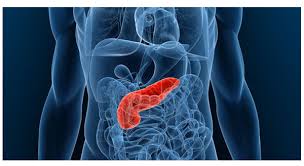- Home
- Editorial
- News
- Practice Guidelines
- Anesthesiology Guidelines
- Cancer Guidelines
- Cardiac Sciences Guidelines
- Critical Care Guidelines
- Dentistry Guidelines
- Dermatology Guidelines
- Diabetes and Endo Guidelines
- Diagnostics Guidelines
- ENT Guidelines
- Featured Practice Guidelines
- Gastroenterology Guidelines
- Geriatrics Guidelines
- Medicine Guidelines
- Nephrology Guidelines
- Neurosciences Guidelines
- Obs and Gynae Guidelines
- Ophthalmology Guidelines
- Orthopaedics Guidelines
- Paediatrics Guidelines
- Psychiatry Guidelines
- Pulmonology Guidelines
- Radiology Guidelines
- Surgery Guidelines
- Urology Guidelines
Pancreatic Cancer Accelerated by Stress : Study

A new study shows that stress accelerates the development of pancreatic cancer by triggering the release of “fight-or-flight” hormones. Beta-blockers—commonly used medications that inhibit these hormones—were found to increase survival in a mouse model of the disease.
An additional analysis of patients with advanced pancreatic cancer revealed that those who were taking selective beta-blockers, which are used to treat heart conditions, lived approximately two-thirds longer than those who were not taking the medications.
The study, conducted by Columbia University Medical Center (CUMC) researchers, was published online in the journal Cancer Cell.
Recent studies have shown that emotional and psychological stress play a role in the development of tumors in general. This effect is thought to occur through the sympathetic nervous system, which releases hormones that give the body a surge of energy so that it can respond to perceived dangers.
“Some biologists dismissed this idea because stress is hard to measure,” said study leader Timothy C. Wang, MD, the Dorothy L. and Daniel H. Silberberg Professor of Medicine at CUMC. “Others wondered how stress could possibly be related to a biological process that involves DNA mutations and the growth of cancer cells within a particular organ, such as the pancreas."
Stress promotes development of precancerous growths in pancreas
The current study was designed to find the links between stress and early development of pancreatic cancer. The researchers studied mice that are genetically predisposed to developing abnormal growths in the pancreas. The mice were raised in stressful living conditions (confined to a small space); control mice were raised in normal housing. After 14 weeks, 38 percent of the stressed mice were found to have neoplastic pancreatic lesions, a precursor to pancreatic cancer. No such lesions were observed in the controls.
“We know that you need a DNA mutation to start on the path to cancer, but our findings suggest that stress is doing something to move things along,” said Dr. Wang.
Stress works via pancreatic nerves
That “something” was the subject of a subsequent experiment. Studies of the mice revealed that stress increases levels of catecholamines—the fight-or-flight hormones—in the bloodstream. Within the pancreas, catecholamines drive production of molecules that stimulate nerve growth around tumors. Those new nerves, in turn, promote tumor development and make more catecholamines, perpetuating the cycle. “In other words, stress sets up what we call a feed-forward loop between nerves and cancer cells that promotes tumor development,” says Dr. Wang.
Beta-blockers may improve survival in pancreatic cancer
In experiments with a different mouse model of pancreatic cancer, the CUMC team demonstrated that treating mice with chemotherapy and nonselective beta-blockers, which are used to treat a variety of conditions, lived significantly longer than mice treated with chemotherapy alone.
The researchers also looked at survival in 631 patients who had surgery to treat advanced pancreatic cancer between 2002 and 2013. Those who were taking nonselective beta-blockers after surgery had a median survival of 40 months, about two-thirds longer than patients taking selective beta-blockers or neither type of beta-blocker.
“It would be premature to recommend the use of beta-blockers for these patients, until we conduct prospective clinical studies said Dr. Wang. “But beta-blockers could potentially become part of the overall treatment regimen for pancreatic cancer.”
Can stress reduction can help prevent or slow prostate cancer?
“A handful of studies, and a lot of anecdotal evidence, suggest that maintaining a positive outlook is good for your health and can help with recovery from almost any disease. Will a positive outlook change the prognosis of a patient with advanced prostate cancer? Probably not. But it certainly won’t hurt, and it could be part of the overall approach to slowing the progression of cancer to allow other types of therapy to kick in,” said Dr. Wang.
The study is titled, “Beta2 adrenergic-neurotrophin feedforward loop promotes pancreatic cancer.” The other authors are Bernhard Renz (University of Munich, Germany, and CUMC), Ryota Takahashi (CUMC), Takayuki Tanaka (CUMC), Marina Macchini (CUMC and IRCCS San Raffaele Scientific Institute, Milan, Italy), Yoku Hayakawa (CUMC and University of Tokyo, Japan), Zaha Dantes (Technical University, Munich, Germany), H. Carlo Maurer (CUMC), Xiaowei Chen (formerly of CUMC), Zhengyu Jiang (CUMC), C. Benedikt Westphale (CUMC and University of Munich), Matthias Ilmer (University of Munich), Giovanni Valenti (CUMC), Sarajo K. Mohanta (University of Munich), Andreas Habernicht (University of Munich), Moritz Middelhoff (CUMC), Timothy Chu (CUMC), Karan Nagar (CUMC), Yagnesh Tailor (CUMC), Riccardo Casadei (University of Bologna, Italy), Mariacristina DiMarco (University of Bologna), Axel Kleespies (University of Munich), Richard Friedman (CUMC), Helen Remotti (CUMC), Maximilian Reichert (Technical University of Munich), Daniel Worthley (CUMC and University of Adelaide, Australia), Jens Neumann (University of Munich), Jens Werner (University of Munich), Alina Iuga (CUMC), and Kenneth Olive (CUMC).
The study was supported by grants from National Institutes of Health (P30CA013696, S10RR025686, and R35CA210088), the Pancreatic Cancer Action Network, the Lustgarten Foundation, German Research Foundation, Uehara Memorial Foundation, the Japanese Society of Gastroenterology, the Japan Agency of Medical Research and Development, National Pancreas Foundation, and the German Cancer Aid Foundation, the KKF Program.

Disclaimer: This site is primarily intended for healthcare professionals. Any content/information on this website does not replace the advice of medical and/or health professionals and should not be construed as medical/diagnostic advice/endorsement or prescription. Use of this site is subject to our terms of use, privacy policy, advertisement policy. © 2020 Minerva Medical Treatment Pvt Ltd